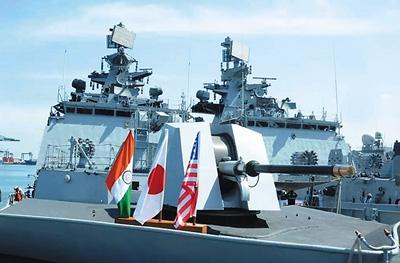


(India, U.S., and Japan navies kick off the Malabar exercise in Chennai, India, July 10, 2017./People's Daily Overseas Edition)
Experts say the timing of the Japanese government's announcement of Prime Minister Shinzo Abe's trip to India in September was carefully selected, as it comes at a time when the standoff between China and India in the Dong Lang (Doklam) area has yet to be resolved.
According to Japan's daily newspaper The Asahi Shimbun, Abe plans to visit India from September 13 to 15, where he will hold talks with Indian Prime Minister Narendra Modi over issues such as defense cooperation and maritime security between the two countries.
The Nikkei newspaper said the trip was arranged in July, and the initial schedule for Abe includes attending a ceremony for a high-speed rail link using Japanese bullet-train technology and strengthening Japan-India maritime cooperation. Japanese government sources say Abe's visit is aimed at pushing India to contain China.
"Abe is a leader with a clear purpose. The timing of the announcement serves certain purposes, though Japanese media have come out to claim his visit has long been planned," said Lv Yaodong, director of the Institute of Japanese Studies' Department of Japanese Diplomacy at the Chinese Academy of Social Sciences.
According to Kyodo News Agency, Japanese Foreign Minister Taro Kono on August 17 attended the "two-plus-two" talks in Washington, committing Japan to provide $500 million to strengthen maritime security in the Indian Ocean and Pacific coast countries.
On August 18, a number of mainstream Indian media headlines claimed "Japan supports the Indian position in the China-India border confrontation" to prove that India has finally won the support of a "major country" in the months-long standoff.
But later that day, Japanese news agency Jiji Press said the Indian media reports on the Japanese ambassador's "support" were denied by the Japanese Embassy in India.
"The border issue is the business of China and India. Japan, by picking a side before any South Asian and Western countries, has exposed its intention of making advances toward India," says Jiang Jingkui, director of the South Asia Research Center at the prestigious Peking University in Beijing.
Though Japan and India have developed a global strategic partnership and strengthened their economic and security alliance over the years, experts say differences in strategy and development should not be overlooked.
"Japan has long acted as the pawn of the U.S., and now it hopes India will stand on its side. But India always prioritizes the principle of non-alignment and pursues leadership in the developing world," Jiang said.
"Therefore, the Indian side is clearly aware that it will lack independence once the India, U.S. and Japan alliance is formed, and Modi also knows an India-Japan alliance would be perceived as weak by the U.S., because Japan would be quick withdraw if the U.S. showed its disapproval," Jiang said.
Jiang suggests India stop further military defense cooperation with countries with ulterior motives, because it will impact Asia in a very negative way. India should maintain its image as an independent country that is capable of dealing with courting from other countries and make due contribution to the peace of Asia.
 Fire brigade in Shanghai holds group wedding
Fire brigade in Shanghai holds group wedding Tourists enjoy ice sculptures in Datan Town, north China
Tourists enjoy ice sculptures in Datan Town, north China Sunset scenery of Dayan Pagoda in Xi'an
Sunset scenery of Dayan Pagoda in Xi'an Tourists have fun at scenic spot in Nanlong Town, NW China
Tourists have fun at scenic spot in Nanlong Town, NW China Harbin attracts tourists by making best use of ice in winter
Harbin attracts tourists by making best use of ice in winter In pics: FIS Alpine Ski Women's World Cup Slalom
In pics: FIS Alpine Ski Women's World Cup Slalom Black-necked cranes rest at reservoir in Lhunzhub County, Lhasa
Black-necked cranes rest at reservoir in Lhunzhub County, Lhasa China's FAST telescope will be available to foreign scientists in April
China's FAST telescope will be available to foreign scientists in April "She power" plays indispensable role in poverty alleviation
"She power" plays indispensable role in poverty alleviation Top 10 world news events of People's Daily in 2020
Top 10 world news events of People's Daily in 2020 Top 10 China news events of People's Daily in 2020
Top 10 China news events of People's Daily in 2020 Top 10 media buzzwords of 2020
Top 10 media buzzwords of 2020 Year-ender:10 major tourism stories of 2020
Year-ender:10 major tourism stories of 2020 No interference in Venezuelan issues
No interference in Venezuelan issues
 Biz prepares for trade spat
Biz prepares for trade spat
 Broadcasting Continent
Broadcasting Continent Australia wins Chinese CEOs as US loses
Australia wins Chinese CEOs as US loses